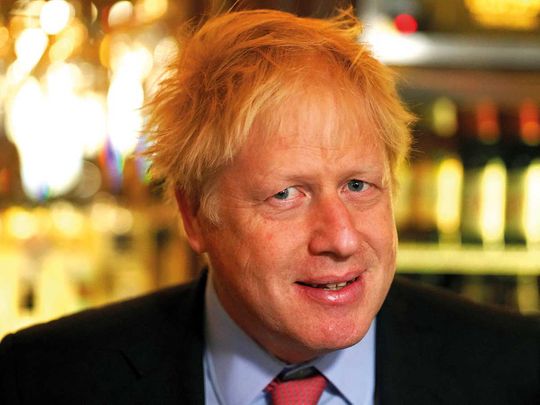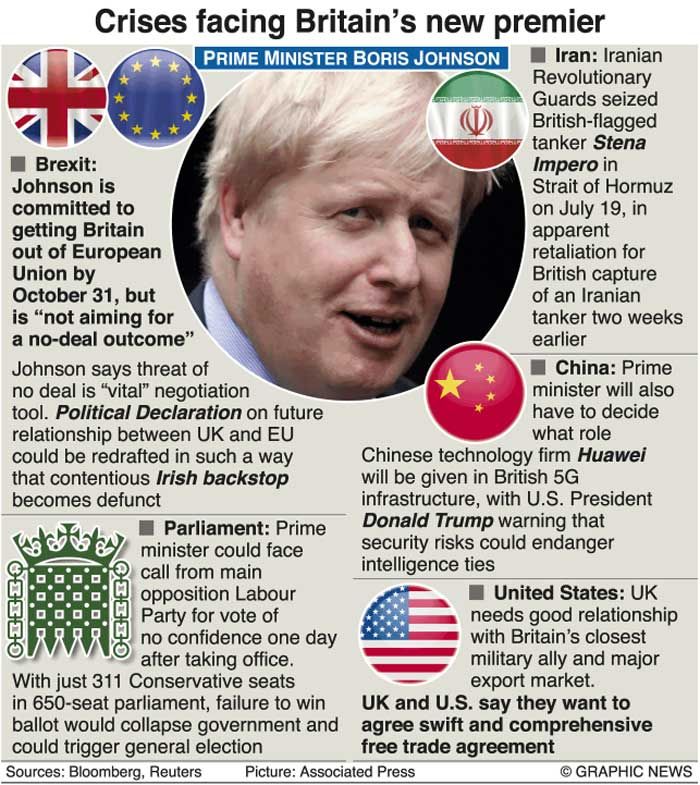
London: Boris Johnson won the race to become Britain's next prime minister on Tuesday, but will face a confrontation over Brexit with Brussels and members of his own party as well as a tense diplomatic standoff with Iran.
The former London mayor easily beat his rival, Foreign Secretary Jeremy Hunt, in a poll conducted among members of the governing Conservative Party.
He is expected to be confirmed as prime minister on Wednesday, when his predecessor Theresa May formally tenders her resignation to Queen Elizabeth II.
It is a triumph for a man who has always wanted the top job, but Johnson, known for his jokes and bluster, is taking over at a time of immense political upheaval.
Three years after the referendum vote to leave the European Union, Britain remains a member, after twice delaying its exit amid continued wrangling in a divided parliament - and the country - on how to proceed.
Johnson led the 2016 Brexit campaign and has said the latest deadline of October 31 must be kept, with or without a divorce agreement with the EU.
But Brussels says it will not renegotiate the deal it struck with May, which was designed to ease the end of a 46-year partnership but which MPs have rejected.
A majority of lawmakers are against a "no deal" Brexit, including many of Johnson's colleagues.
Three cabinet ministers have already said they will not serve under Johnson, saying that severing ties with Britain's closest trading partner with no new arrangements is deeply irresponsible.
The government's official forecaster said last week that Britain will slide into a year-long recession should it leave the EU without a deal.

Boris Johnson vows to 'get Brexit done' on October 31
Boris Johnson vowed on Tuesday to "get Brexit done" by the twice-delayed October 31 deadline, after defeating Foreign Secretary Jeremy Hunt in the race to become next British premier.
"We're going to get Brexit done on October 31," Johnson said moments after being declared the winner of the Conservative party leadership race.
Key dates
- June 19, 1964: He is born as Alexander Boris de Pfeffel Johnson in New York, where his father is studying at Colombia University.
- 1983: Having been schooled at Eton, he enters Oxford's Balliol College where he graduates in classics four years later.
- 1987-1988: Works as a journalist for The Times newspaper, from where he is sacked for fabricating quotes.
- 1989-1994: Becomes The Daily Telegraph's EU correspondent in Brussels, known for his deeply eurosceptic writings.
- 1999-2005: Editor of news magazine The Spectator.
- 2001: Elected as Conservative member of parliament for the Henley constituency near London. Re-elected in 2005.
- 2008: Defeats Ken Livingstone to become mayor of London. After being re-elected for another four years in 2012, he oversees the city's hosting of that year's Olympic Games.
- 2015: Elected as MP for Uxbridge and South Ruislip constituency on the outskirts of London. Re-elected in 2017.
- June 2016: Prime minister David Cameron resigns when Britons vote to leave the European Union. Johnson - a Brexit champion - pulls out of the race to replace him at the last minute after a key ally betrays him.
- July 13, 2016: He is appointed foreign secretary in the government of the new prime minister, Theresa May.
- July 9, 2018: Resigns over May's Brexit strategy.
- July 23, 2019: Wins the race to replace May as Britain's next prime minister, beating Foreign Secretary Jeremy Hunt in the Conservative leadership contest.
- July 24, 2019: Due to be formally installed as prime minister at a meeting with Queen Elizabeth II.








